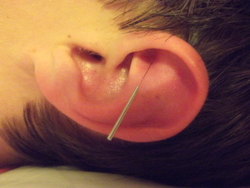A small UK pilot study suggests acupuncture may hold promise as a treatment for the pain of multiple sclerosis (MS). Twenty MS patients attending a nurse-led complementary therapy clinic, were invited to evaluate the service using a questionnaire: there were 25 questions concerning pain relief, sleep pattern, mood improvement, energy levels, mobility issues, and analgesic medication use. All patients had received acupuncture to help with pain relief, and all had attended the clinic for between three and twenty-four months. Most patients received acupuncture at six-weekly intervals, 85% were female, and their ages ranged from 20 to 60. They had had their diagnosis for between one and 29 years.
All patients reported some pain reduction, nine reporting pain relief of 8/10 or better. Eighteen of the twenty patients obtained pain relief for four or more weeks, although nine noted a temporary pain increase first. Three patients managed to stop using pain-killing medication altogether. Sleep patterns, mood, energy levels and mobility were also reported as improving. The authors conclude that this study demonstrates clear benefit from acupuncture as a treatment for pain in MS patients.
(Acupuncture is an effective treatment for pain and other MS symptoms. Journal of Neurology, Neurosurgery & Psychiatry, 2013.)



